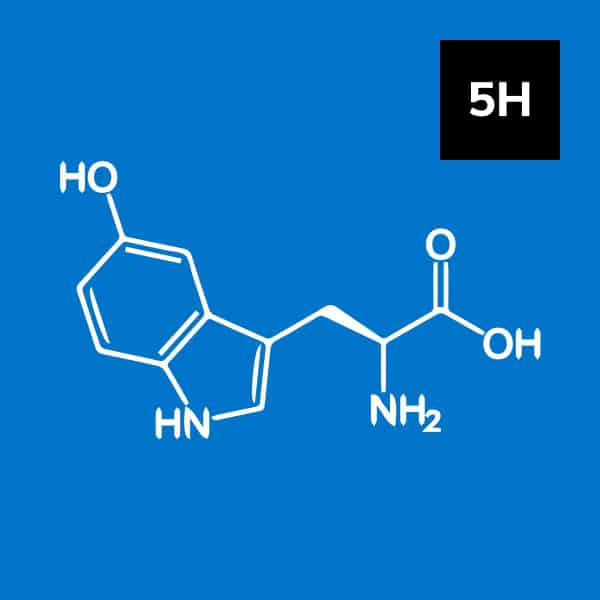Overview
5-HTP (L-5-hydroxytryptophan) is a serotonin-enhancing amino acid that’s a metabolite of 1-tryptophan used by the human body. It is an important neurotransmitter in the brain that regulates many functions related to mood, behavior, memory, learning, sexual behavior, pain control, sleep, and appetite.
Key Benefits
- Increases serotonin in the brain
- Enhances sleep
- Helps regulate mood
- Helps reduce the frequency of migraine headaches
- Suppresses the appetite
History of Usage
5-HTP was discovered to be the primary active ingredient of the Griffonia Simplicifolia seeds, which has been used in native medicine for hundreds of years. Western and Central Africa are the native habitats of the plant. Griffonia Simplicifolia was used as an antiseptic and given as an anti-inflammatory for pain, sickle cell anemia, burns, kidney disease, vomiting, diarrhea, and tooth decay. To treat lice in chickens, 5-HTP is administered to the animals as well.
Today, studies have shown that 5-HTP supplements, which are still made from the seeds of Griffonia Simplicifolia or synthesized in the laboratory, increase the amount of serotonin available for use by neurons.
The first modern use of 5-HTP was in psychological disorders such as depression and schizophrenia. Since then, researchers have found that since 5-HTP helps increase serotonin, the amino acid has a positive effect on emotions, mood, sleep, anxiety, appetite, and pain sensation.
5-HTP is found in many multivitamin and herbal preparations, as well as single-ingredient dietary supplements.
Biochemistry
5-HTP is not abundant in a regular diet. It is synthesized by the human body from L-tryptophan, a naturally occurring amino acid included in the majority of dietary proteins. However, eating food that contains L-tryptophan does not significantly increase 5-HTP levels, which decrease with age.
Supplemental 5-HTP is naturally derived from the seeds of Griffonia simplicifolia, a West African legume that grows on a tall, bushy vine. Synthetic versions of 5-HTP have the identical molecular structure to the botanical extract and the biological effects are the same.
After it is ingested, 5-HTP crosses the blood-brain barrier, where it gets converted into serotonin in the brain. It also appears to increase dopamine, melatonin, noradrenalin, and beta endorphin, brain neurotransmitters, and hormones that have an impact on learning recall, mood, and sleep.
Low 5-HTP levels have been linked to depression, anxiety, sleep issues, obesity, and a variety of other health concerns.
Serotonin appears to affect sleep via its effect on melatonin, the hormone that helps determine the sleep-wake cycle. 5-HTP is believed to enhance sleep by boosting the production of melatonin.
Recent Trends
5-Hydroxytryptophan ‘s (5-HTP) market was valued at USD 47.9 Million in 2020 and it is projected to reach USD 83.1 Million by 2028, growing at a CAGR of 7.10% from 2021 to 2028.
5-HTP is commonly used as an antidepressant, hunger suppressant, and sleep aid in Australia, the United Kingdom, the United States, and Canada. People who are coming down from MDMA (3,4-methylenedioxymethamphetamine, which is a derivative of amphetamine, also known as Ecstasy or Molly) may take 5-HTP to help with post-MDMA dysphoria.
Because 5-HTP is a precursor for the brain to make more serotonin and MDMA depletes natural serotonin levels, ingesting 5-HTP after MDMA usage may increase serotonin production. However, 5-HTP’s short half-life may restrict its therapeutic usefulness.
The rising anti-depressant demand due to rising anxiety is expected to boost the 5-HTP market need. Using 5-HTP instead of chemically produced tryptophan is likely to drive market growth throughout the forecast period.
Precautions
- Women who are pregnant or breastfeeding should avoid 5-HTP.
- 5-HTP should not be used in conjunction with antidepressants, weight-control medications, or other serotonin-reuptake inhibitors.
- 5-HTP should not be taken with: Carbidopa (Lodosyn), Dextromethorphan (Robitussin DM), Meperidine (Demerol), Pentazocine (Talwin), or Tramadol (Ultram).
- Individuals should stop taking 5-HTP at least 2 weeks before surgery.
- Side effects of taking 5-HTP can include: heartburn, nausea, diarrhea, vomiting, fatigue, muscle discomfort and stomach pain.
References
- Maffei ME. 5-Hydroxytryptophan (5-HTP): Natural Occurrence, Analysis, Biosynthesis, Biotechnology, Physiology and Toxicology. Int J Mol Sci. 2020 Dec 26;22(1):181. doi: 10.3390/ijms22010181. PMID: 33375373; PMCID: PMC7796270.Takahashi S, Kondo H, Kato N. Effect of L-5-hydroxytryptophan on brain monomine metabolism and evaluation of its clinical effect in depressed patients. J Psychiat Res. 1975;12:177-187.
- Kahn RS< Westenberg HGM. L-5-hydroxytryptophan in the treatment of anxiety disorders. J Affect Disord. 1985;8:197-200.
- Den Boer JA, Westenberg HGM. Behavioral, neuroendocrine, and biochemical effects of L-5-hydroxytryptophan administration in panic disorder. Psychiatry Res. 1990;31:267-278.
- Soulairac A, ambinet H. Aciton du 5-hydroxytryptophane, precurseur de la serotonine, sur les troubles du sommeil. Ann Med-Psychol. 1977;135:792-798.
- De Benedittis G, Massei R. 5-HT precursors in migraine prophylaxis: A double-blind cross-over study with L-5-hydroxytryptophan versus placebo. Clin J Pain. 1986;3:123-129.
- Cangiano C, Ceci F, Cascino A, et al. Eating behavior and adherence to dietary prescriptions in obese subjects treated with 5-hydroxytryptophan. Am J Clin Nutr. 1992;56:863-868
- Halford JC, Harrold JA, Lawton CL, Blundell JE. Serotonin (5-HT) drugs: effects on appetite expression and use for the treatment of obesity. Curr Drug Targets. 2005 Mar;6(2):201-13. doi: 10.2174/1389450053174550. PMID: 15777190.
- Shell W, Bullias D, Charuvastra E, May LA, Silver DS. A randomized, placebo-controlled trial of an amino acid preparation on timing and quality of sleep. Am J Ther. 2010 Mar-Apr;17(2):133-9.
- Al-Shamma HA, Anderson C, Chuang E, Luthringer R, Grottick AJ, Hauser E, Morgan M, Shanahan W, Teegarden BR, Thomsen WJ, Behan D. Nelotanserin, a novel selective human 5-hydroxytryptamine2A inverse agonist for the treatment of insomnia. J Pharmacol Exp Ther. 2010 Jan;332(1):281-90. Epub 2009 Oct 19.




